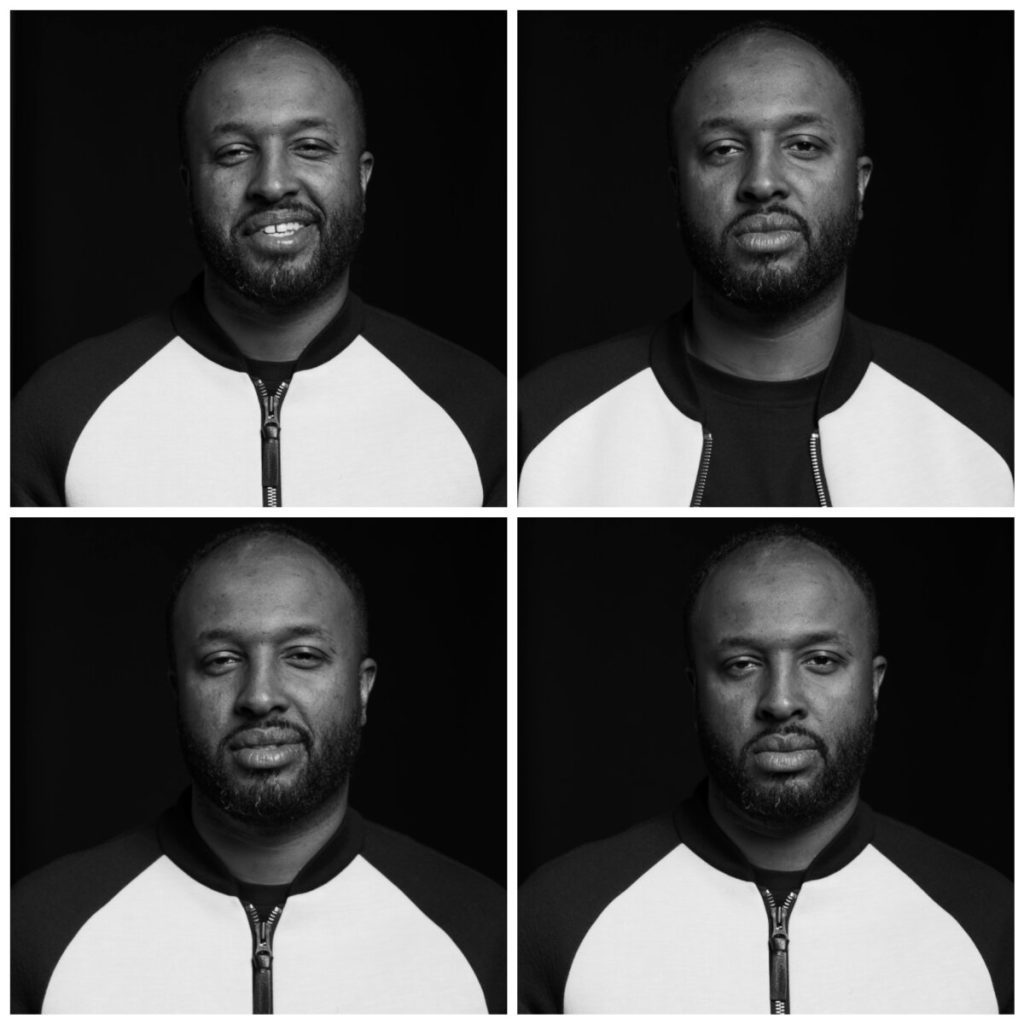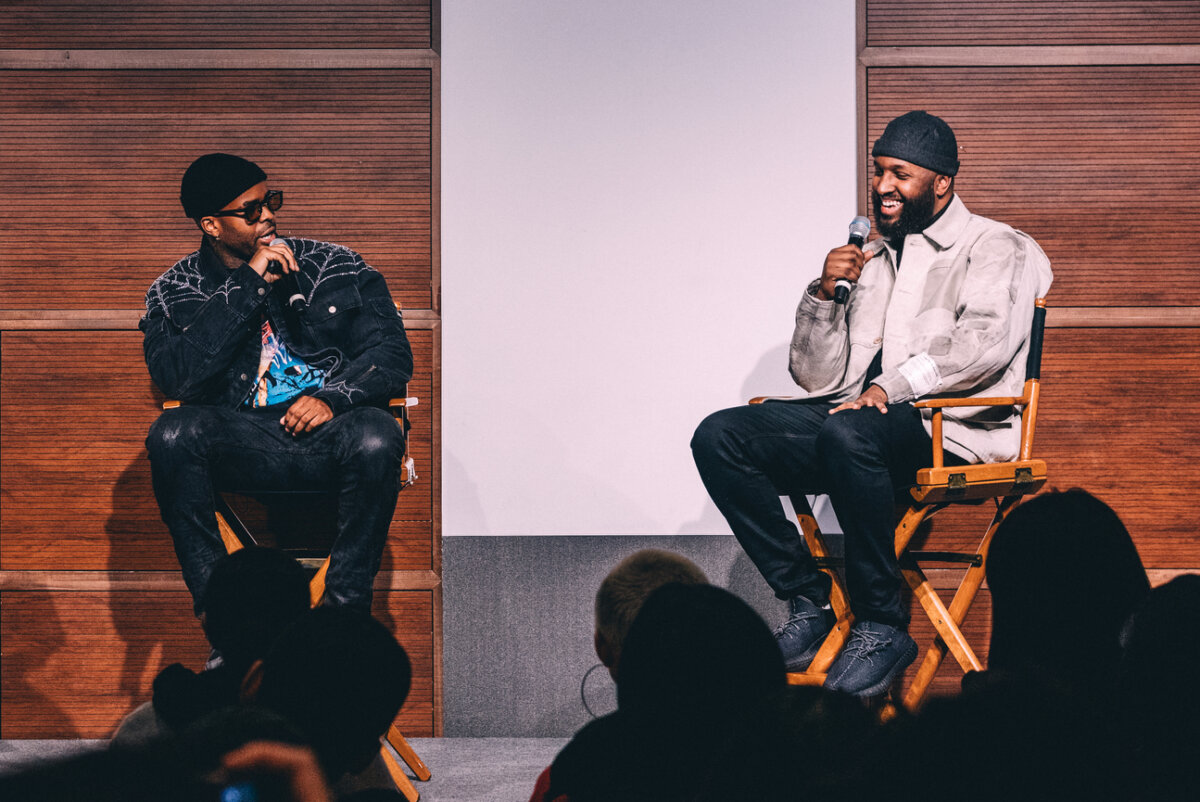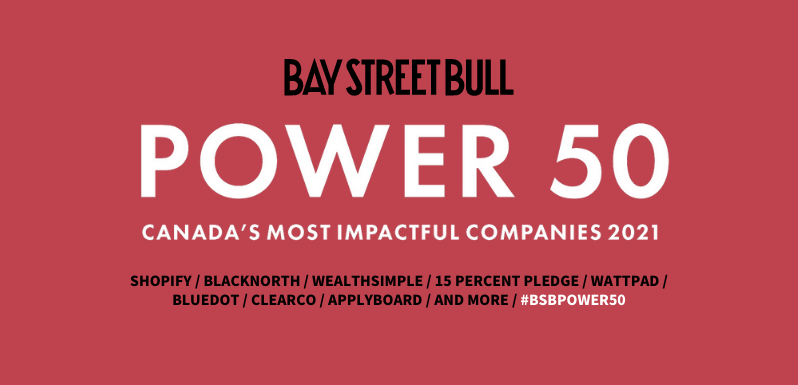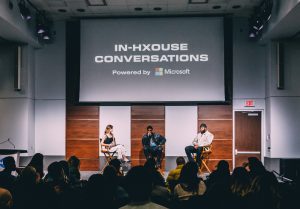Located in Toronto’s east end, HXOUSE is a creative incubator and launchpad for Canadian creators and entrepreneurs. Ahmed Ismail, along with Abel Tesfaye (better known as The Weeknd) and La Mar Taylor—all Scarborough natives—founded the communal creative hub to invest in and nurture homegrown talent.
Having left home to go to school in the US, Ismail was building an impressive career in the worlds of politics and sports marketing before coming back to Canada. Despite working for renowned former US congressman John Conyers Jr. and brushing arms with political and sports bigwigs, Ismail was more interested in fostering upcoming creatives to build their skills and their success—something he felt was missing in Canada.
“As a political science junkie, my favourite person in Canada was Peter Mansbridge. He had a quote where he said, ‘Canadians have a hard time creating their own heroes.’ And it stuck with me,” said Ismail. “I didn’t have somebody of colour, a young person, or an immigrant to look up to.”
The lack of Canadian heroes was not due to a lack of Canadian talent but rather an ecosystem that did not actively foster and cultivate that talent. Through HXOUSE, Ismail hopes to provide the bedrock for Canada’s creative community.
“When we were on tour, we would open up our backstage to meet the top creatives, founders, and tech companies in every city. What we started to notice was that they were Canadian or working with a Canadian,” said Ismail. “We saw the exodus in every market: Berlin, New York, LA, Paris, and London. I realized that Canada’s biggest export is people and asked myself how we could reverse that trend.”
Recently named as part of the 2020 Power 50 for his contribution to Canada’s business landscape, Ismail said that he hopes HXOUSE is the solution. Here, he discusses creativity, starting his entrepreneurial journey, and nurturing Canadian talent.
Can you describe the HXOUSE mission statement? What is it and how will you know when you’ve achieved it?
We came to the conclusion that the system that is currently in place is broken. We just want to change the rules and everything that we’ve been taught, and give people an opportunity to pursue their dreams. We want to put people in positions of power, or at least give them the opportunity to instead of closing doors that they never knew about or even opened.
A big part of your organization is grounded in community. What does community mean to you?
I think the foundation of community is understanding that we don’t know everything and acknowledging that we all had to scratch and crawl to make it to where we are now. There are so many great people who have made it to great places and do not have a platform where they can give back. The great thing about the HXOUSE community is that these people who choose to give back and invest in our community have a platform that’s already built for them to do so. We can have the pillars of every industry donate their time back to us.
People don’t want to see things from the penthouse anymore, they want to come down to the ground floor. At HXOUSE, we aggregate and cultivate a great pool of people from every walk of life, who have traveled around the world to come here. It’s a great place to make people human again and have a chance to interact and meet people that they would’ve never met.
“To be a leader, you have to listen. If you can’t relate, you don’t deserve that customer or that constituent to vote for you.”
Has it been challenging to convince people in the “penthouse” to come down to the ground floor? What have been some of the challenges around creating this new culture of talent and community?
It was a perfect storm, but it’s still challenging. As somebody who works in the marketing world, for every ten pitches, a great success rate is three or four that make it through. This project had no room or margin for error because I knew I couldn’t waste the investment co-signed by La Mar [Taylor] and Abel [The Weeknd].
In the beginning, you will always have the naysayers and detractors. What we wanted to show was that we weren’t going to wait around for the people on the top floor. We were going to do it ourselves, cultivate relationships, and build an amazing platform. It’s going to be the biggest thing, not in Toronto, but the world. Our mission and the message that we sent to the corporate world was, You could support this and look like you’re ahead of the curve, or we could fund this ourselves and you’ll regret that we didn’t do this together. Our mindset wasn’t whether or not they wanted to do it with us or not, it was about getting the job done.
Were you instilling a sense of corporate FOMO?
That’s definitely what we created. The best way to say it is corporate FOMO. They never thought that we would put millions of dollars into this project. In doing so, we created our own audience and now have analytics that nobody has; we have the understanding of the community and insights that nobody has.
Every other brand is spending aimlessly to try to attract this demographic of creatives that’s a very hard and fickle one to get. Because we did the due diligence and made authentic relationships. We had full buy-in at all levels of creativity by shaking hands one-on-one in the community and meeting everybody.
It was remarkable for me to see the big Bay Street firms start to pay attention and say, These kids have figured it out. Why don’t they come and spend time and teach us? I realized Bay Street was listening to me when I got a call from BMO. They said, “What you did at HXOUSE is great. We want to put it on the ground for innovation. Can you spend time with our senior leadership team, teach us better techniques, and help us understand how to make impactful long term opportunities?” To be working with a brand as big as the eighth-largest bank in North America and being told that my insight is relevant, it was a different level of validation.
What did working in politics teach you about business?
What I’ve learned in politics is that the most successful politicians are not the ones who say they know everything. It’s the ones who react based on the climate around them and the needs of their constituents. In the corporate world, if you’re not willing to get on the ground floor and be a civilian, how can you expect to sell to that customer?
There are a lot of people who assume that to be at the top of the game, you have to climb up the corporate ladder and get to the top floor. By the time you get there, though, everyone looks like ants and you can’t see what’s going on on the ground. Any successful CEO or executive or politician that I’ve ever worked with has not been afraid to roll up their sleeves in order to meet their constituents or customers directly.
To be a leader, you have to listen. If you can’t relate, you don’t deserve that customer or that constituent to vote for you. If you don’t understand their grief or fight, you have to do a better job. People just want you to listen and that is something I learned from President Obama. Sometimes it’s not about listening and then talking—it’s about listening, and then listening some more.
“Sometimes it’s not about listening and then talking—it’s about listening, and then listening some more.”
What are you seeing in the talent that’s coming out of HXOUSE?
What we’re seeing at HXOUSE are young kids that are finally getting the reinforcement and endorsement that they’re talented, and the encouragement to refine their talent. It gives them the confidence and the ability to be fearless, to be able to sell, export, or generate revenue from these opportunities and their talent.
Do you think there is still a mindset around creativity and commerce belonging in separate silos when it comes to the way we approach work?
No, because the new commodity is creativity. As we embrace technology further and focus on automation, the most successful person is going to be the creative who can figure out the new industry—the new product or thing that innovation and automation has already destroyed. The next big thing is going to come from a creative person who will use engineers to build it. What we’re teaching now is creativity with innovation and economics wrapped around it. Without creativity, there is no economy. Kodak could have bought GoPro for a fraction of what it was worth, and they passed on it. Netflix could have been bought by Blockbuster, but Blockbuster passed on them. History has taught us that those who create get to stay and those who don’t, die.
“The new commodity is creativity”


How do you teach creativity?
Everyone has some sort of voice in their head; it just depends on how close it is to you or if you push it away. We’re teaching our students at HXOUSE how to listen to that voice in their head and be intuitive about it. Intuition gives you insight, which leads to feedback, which can be converted into an opportunity.
The typical trajectory of a person is to go to school and get a job. But then people hit a wall at 30, 35, or in their 40s because they don’t feel fulfilled from whatever it was that they were chasing, possibly because it was never what they wanted in the first place. They never listened to the voice in their head. How can you reach fulfillment if you don’t listen to yourself?
You’ve mentioned previously that you don’t want to be an airplane, you want to be an airport. What did you mean by that?
Ideas are like planes. A propeller plane can go up but it can only fly short distances because of its fuel tanks. Great ideas are like 747s and jumbo jets. They can take on more fuel and travel longer distances, but all planes have to land at some point and that’s like all ideas. You’ve always got to create another idea, which people have a hard time doing.
I want to be an airport and build a platform for ideas. People need air traffic control, right? You can use our runway at HXOUSE to start your career, pilot your tech product or your venture, and get some insight to launch yourself. I want to build more airports because those are the platforms that are missing to hyper accelerate people’s ingenuity and enterprising skills.
What can we do to cultivate and retain talent here in Canada?
I recently sat down and had dinner with some of the biggest CEOs, presidents, and executives of the top ten tech companies in Canada. I noticed that they were all competing against each other for the same talent. None of them knew how to solve this problem and it created friction amongst all these big conglomerate companies.
My question and my answer to them was, How do you make more tea? If the pot already has tea in it, you just add more water. The teapot symbolizes the job market in Canada. If you just add more water, if you invest in more technical people, institutions, and funding, you won’t have an HR issue anymore because you’ll have an overflow of talent. Right now, they’re fighting for the same applicants. If you want good people to stay you need to give them an opportunity to develop inside of your organization. If you keep taking the best talent but just put them in a corner, eventually they’ll realize their talent is being wasted.
There’s a new generation that cares more about their talent being utilized than the compensation they’re getting. The number one reason why young people are leaving Canada is because they feel like their talent is being unfulfilled. What I’m trying to do is give them an opportunity to fulfill that talent.
“The number one reason why young people are leaving Canada is because they feel like their talent is being unfulfilled.”
You’ve been able to harness a lot of incredible international talent and bring them to Toronto as HXOUSE mentors. What is one of your favorite pieces of insight from the people that you have brought over?
I think [Away founder] Jen Rubio said it best: There’s a special place in hell if somebody lies to you and tells you entrepreneurship is easy. I believe this wholeheartedly because I know what I sacrificed and what I still sacrifice today to chase my dreams. It’s the hardest thing I’ve ever done but the reward comes later. If an entrepreneur is ready to put those hours in and sink or swim, I would tell them to not ever underestimate the entrepreneur and startup grind.
Another piece of advice I like is that even if you’re the founder or an owner, you have to live and work like you’re always playing for a roster spot in your own company. It changes the culture when employees see the boss throwing out the garbage or working longer hours.
Was there a turning point in your career that set you on the path of entrepreneurship?
I got hired by the Detroit Pistons as an intern, and at that point, I thought I had made it. I was working with the NBA elites and it was only a matter of time before I became one of these people, right? Then somewhere in there I saw all the negatives of corporate culture and how corporates never listen. They never take insight, and then when everything fails, they wonder why. If you’re invisible, then why are you there? So at 26, I made the decision to never work for anybody again.
I think the best advice I’ve received came from my father. He said, “Never let another person determine when you wake up or go to bed.” He was an entrepreneur and was already planting the culture of entrepreneurship in my brain.
How do you define success?
Success is waking up every morning and knowing you’re doing what you love with no regret. It is different for everyone. For me, it is about being remembered for the good I’ve done for people and the doors I’ve opened because that far outlives anything else.











